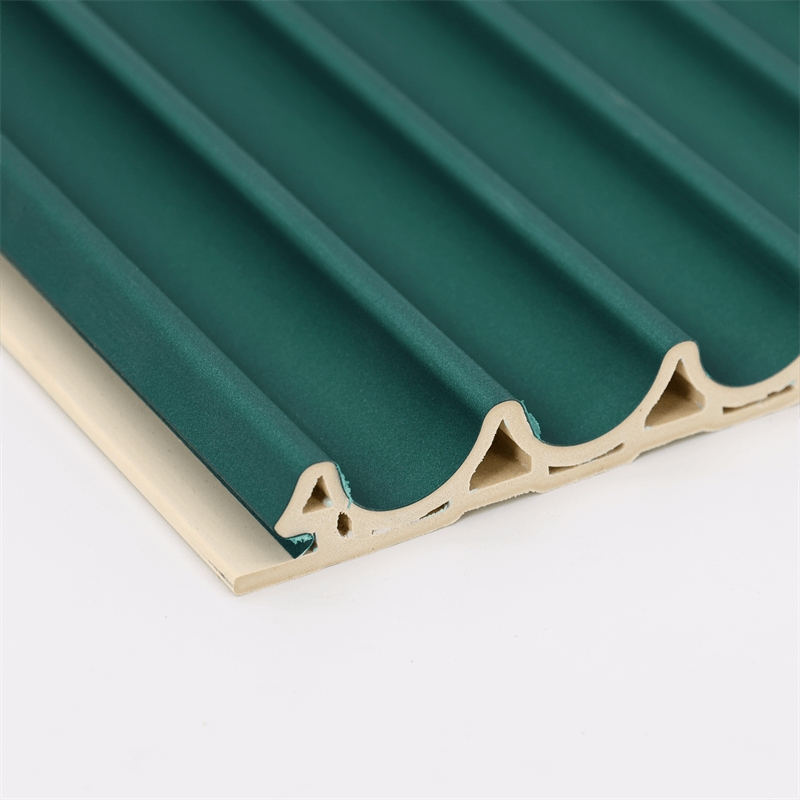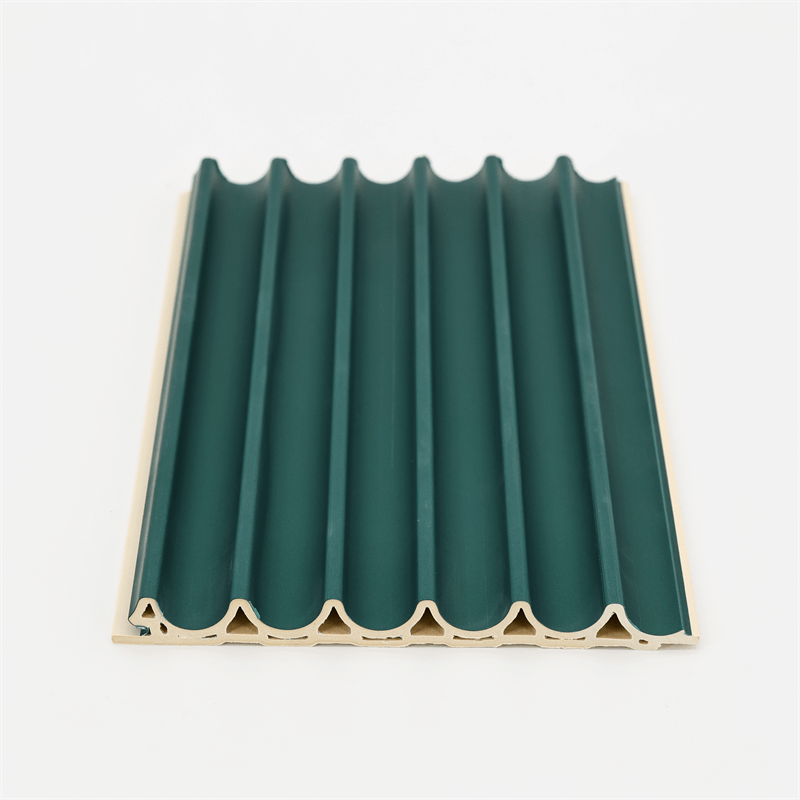In the realm of interior design and construction, wall materials play a crucial role in determining the aesthetics, functionality, and durability of a space.
Traditional materials such as wood, gypsum, and brick have been widely used for decades.
However, with the advancement of technology, a new contender has emerged: WPC (Wood-Plastic Composite) wall panels.
In this essay, we will explore the advantages of WPC wall panels over traditional materials, focusing on their durability, moisture resistance, eco-friendliness, and ease of installation.
I. Durability: Withstanding the Test of Time
Durability is a key consideration when selecting wall materials, as they should be able to withstand daily wear and tear, impacts, and the test of time.
WPC wall panels offer several advantages over traditional materials in terms of durability.
- Resistance to Moisture and Decay: Unlike natural wood, which is susceptible to moisture and decay, WPC panels exhibit high resistance to these elements. The combination of wood fibers or flour and recycled plastics in WPC panels makes them impervious to water absorption, preventing issues such as swelling, warping, or rotting.
- Impact Resistance: WPC wall panels are engineered to be highly impact-resistant, making them suitable for areas prone to accidental impacts or bumps. Unlike gypsum-based materials that can crack or break upon impact, WPC panels remain intact, maintaining their structural integrity and visual appeal.
- Longevity: WPC wall panels have a longer lifespan compared to traditional materials. They are designed to withstand the elements and resist fading, chipping, or peeling. This extended lifespan reduces the need for frequent replacements, saving time, money, and resources in the long run.
II. Moisture Resistance: Keeping Walls Intact and Aesthetically Pleasing
Moisture resistance is a crucial factor, particularly in areas such as bathrooms, kitchens, and basements, where water exposure is common.
WPC wall panels offer significant advantages over traditional materials in terms of moisture resistance.
- Waterproof Composition: WPC panels are inherently waterproof due to their composition of wood fibers or flour and recycled plastics. Unlike gypsum-based materials or natural wood, they do not absorb water, preventing issues such as mold growth, warping, or deterioration.
- Mold and Mildew Resistance: The moisture resistance of WPC wall panels inhibits the growth of mold and mildew. These panels do not provide a suitable environment for mold spores to thrive, contributing to improved indoor air quality and reducing health risks associated with mold exposure.
- Easy Cleanup: WPC panels are easy to clean and maintain in moisture-prone areas. Their smooth and non-porous surface resists stains and allows for easy wiping with a damp cloth or mild cleaning solution, keeping the walls hygienic and aesthetically pleasing.
III. Eco-Friendliness: A Sustainable Alternative
In an era of growing environmental consciousness, choosing eco-friendly materials is paramount.
WPC wall panels offer several advantages over traditional materials in terms of sustainability and environmental impact.
- Use of Recycled Materials: WPC panels are made from a combination of wood fibers or flour and recycled plastics. By incorporating recycled materials, WPC panels help reduce waste and promote resource conservation, contributing to a more sustainable approach to construction and design.
- Reduced Carbon Footprint: The production process of WPC panels consumes less energy and generates lower greenhouse gas emissions compared to traditional wall materials. By choosing WPC panels over materials that require extensive energy-intensive manufacturing processes, individuals can make a positive impact on reducing their carbon footprint.
- Recyclability: At the end of their useful life, WPC wall panels can be recycled, further reducing their environmental impact. This recyclability ensures that the materials can be repurposed rather than ending up in landfills, supporting a circular economy and reducing waste.
IV. Ease of Installation: Saving Time and Effort
The ease of installation is a practical consideration when selecting wall materials. WPC wall panels offer advantages over traditional materials in terms of ease and efficiency of installation.
- Lightweight: WPC panels are lightweight compared to traditional materials such as brick or stone, making them easier to handle and transport. This characteristic simplifies the installation process, reducing the need for heavy machinery or extensive manpower.
- Interlocking System: Many WPC wall panels feature an interlocking system, allowing for quick and straightforward installation. The panels can be easily connected and secured, eliminating the need for adhesives or complex installation techniques.
- Cost-Effective: The ease of installation and reduced labor requirements of WPC panels contribute to cost savings. With shorter installation times and lower labor costs, individuals can achieve a cost-effective solution without compromising on quality or aesthetics.
WPC wall panels offer a range of advantages over traditional materials, making them a superior choice for interior design and construction.
Their durability, moisture resistance, eco-friendliness, and ease of installation set them apart in terms of performance and sustainability.
By opting for WPC wall panels, individuals can enjoy long-lasting walls that withstand the test of time, resist moisture and decay, and offer excellent impact resistance.
The moisture resistance properties of WPC panels ensure that walls remain intact, aesthetically pleasing, and free from mold and mildew growth.
Furthermore, the use of recycled materials, reduced carbon footprint, and recyclability of WPC panels contribute to a more sustainable approach to construction and design.
The ease of installation and cost-effectiveness of WPC panels make them a practical choice for both homeowners and professionals.
Their lightweight nature, interlocking system, and efficient installation process save time, effort, and money.

In conclusion, WPC wall panels surpass traditional materials in terms of durability, moisture resistance, eco-friendliness, and ease of installation.
By embracing the advantages of WPC panels, individuals can achieve aesthetically pleasing, sustainable, and long-lasting interior spaces that meet their functional and design needs.
In conclusion, WPC wall panels offer numerous advantages over traditional materials, making them an excellent choice for interior design and construction projects.
Their durability ensures long-lasting walls that can withstand daily wear and tear, impacts, and the test of time.
The moisture resistance properties of WPC panels make them ideal for moisture-prone areas, preventing issues such as water damage, mold, and mildew growth.
Moreover, WPC wall panels contribute to sustainability efforts with their use of recycled materials, reduced carbon footprint, and recyclability.
By choosing WPC panels, individuals can actively participate in creating a more environmentally friendly construction industry.
The ease of installation of WPC panels saves time, effort, and costs, making them a practical choice for homeowners and professionals alike.
Their lightweight nature and interlocking system simplify the installation process, allowing for efficient and hassle-free completion of projects.
Overall, WPC wall panels are a superior alternative to traditional materials in terms of durability, moisture resistance, sustainability, and ease of installation.
By incorporating WPC panels into interior spaces, individuals can create visually appealing, functional, and long-lasting environments that meet their design preferences and contribute to a more sustainable future.

